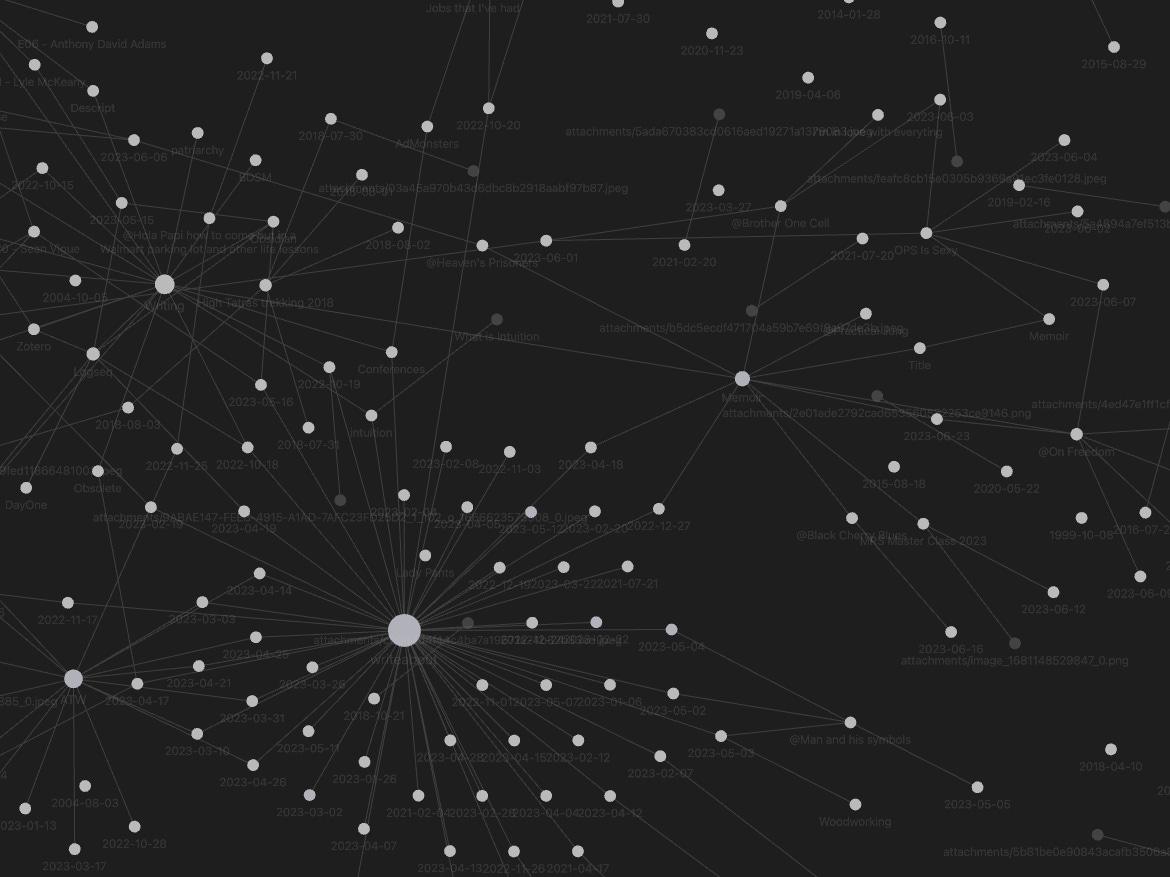Tools for Writers: Moving from Logseq to Obsidian
Choose the tool that gets used the most
I love good tools, and I’m also a big fan of remaining unattached to any particular one. Things change, new tools emerge, and while the software-tool paradigm used to be more like the search for the holy grail—one tool for everything, forever!—these days, the freedom to be able to move your own data around as you wish is becoming more highly valued than a single solution that tries to do everything. The tools that I use these days are mostly writing tools, but I also mean whatever tools. Bicycles. Bedsheets. Breakfast. They’re all tools, in a way.
Using a Digital Knowledge Garden
One tool that I now use all the time is something that falls into the category often called “second brain,” or “knowledge garden” apps. If you ever used a wiki, apps like Logseq and Obsidian will look very familiar, and they use plain text Markdown files on your own computer for storage instead of anything proprietary.
Once I discovered this new type of tool several months ago, I was able to consolidate a whole bunch of things into a single app/tool/knowledge base, combining daily journaling, short notes, to-do lists, and my reading/listening notes. The biggest advantage is that now I can search across all of my personal notes, todos, journal entries, reading notes, etc, all in one place, and link from one thing to another very easily. I still use Scrivener for long-form writing, but I no longer need to use Day One, a Notes or Todo app, or even Zotero for reading notes—all of that is in Obsidian now.
While there are other tools in this category including Notion, Roam, and others, I started with Logseq, because it’s open source. Over time though, it began to feel too slow, and I could never get sync to work well enough to use the iPhone app, which meant that I would end up using the Notes app to take quick notes, and then move them over into Logseq later—not very elegant. This got frustrating enough that I took another look at Obsidian and ended up switching. There are a few differences between Logseq and Obsidian, but they both use Markdown (.md) files to store everything, and so for the most part I was just able to close one app and open the other, using the same data files.
I already like Obsidian better than Logseq
Looking back at my notes about Logseq, I had said that one area in which it could be improved is the UI. Logseq is a bit primitive, and I’m happy to say that Obsidian is prettier, and also has a more comprehensive and under stable keyboard shortcut/hotkey setup. It still doesn’t have native autocorrect (due to the platform that Obsidian is built on), but I’m not doing my long form writing there anyhow, so I can live with this.
The biggest difference is that Obsidian is way faster—and that iCloud sync just works (and it’s free if you already use iCloud), whereas Logseq wanted you to use their own proprietary syncing extension, and that didn’t work very well anyhow. There’s no need to pay for anything, just use iCloud sync. Search in Obsidian is instantaneous, and sync takes just a couple of seconds at most. The Logseq iPhone app would often just hang up or fail, whereas the Obsidian app opens very quickly and I can edit a note on the phone and the Mac and not lose edits.
Some of the Obsidian plugins I’m using are Daily Notes, Tags, Calendar, Copy Block Link, Jump-To-Date, Omnisearch, Outliner, Tag Wrangler, and Tasks. Some folks really love the graph view, and it does look cool, but I don’t find it that useful in practical terms.
The reason I’m sharing this is that, especially as a writer, I want to—and enjoy—having all of my notes and material of various sorts at my fingertips. I know lots of people love making notes by hand, and I do at times as well… but in the end, I grew up with computers, and I love having everything in one place, searchable and linkable. Especially if you’re a writer as well, I’d encourage you to check out Obsidian, or Logseq, or one of the other similar tools that can unify your personal knowledge management. Try a couple out, and then just use the one you like best. At last with Obsidian and Logseq, it’s fairly painless to switch—the trick is getting all your data in there in the first place, but there are some good tips out there for that too.
Some of my other favorite tools
How physical fitness supports my creativity and my work as a writer
Just a couple of months ago, I wrote about a horrible attack of a sciatica that laid me out for two weeks straight and reminded me how devastating it is to be even partially physically debilitated. That episode had its roots in an injury that I sustained more than 20 years ago, the reason for which I knew just as well then as I do now: a lack of enough …
What is Intuition? A Whole and Open Mind
What is intuition? There are so many ways of describing what’s often called intuition—and still it can remain hard to define, hard to reach, hard to hear, and hard to understand. Words wear out, and this old word that once meant something like “tutor, guardian, or ‘private teacher within
And now — some questions for you…
Do you use a knowledge management tool like Obsidian, Logseq, Roam, Notion or any of the other writing tools mentioned in this piece? What other or different tools do you use for writing? How do you use them together?
What do you use for long form writing? If you’re still using Word, please see me in the office later.
What’s your favorite physical tool in your toolbox? Do you carry any tools with you, like a knife or a Leatherman? (I don’t even carry a wallet these days)
What are some of your other metaphorical ‘tools,’ axioms, or mottoes?
Was this worth your time?
Use the heart ♡ below to let me know
👇🏻





Thanks for this write-up. As a result of pursuing information on Obsidian for writing, notes, etc., I've just read a number of your articles. I've found each to be helpful. I appreciate your personal approach to what you're sharing.
For what it's worth, some people may find using Obsidian and LogSeq together, on the same data is useful. There's various articles and videos online explaining how to do so. I'm not yet convinced there's any real advantage to doing so (for me, at least), but thought I'd mention that it's at least possible and therefore an option.
Well now you’ve got me thinking of using one of these! I know you’re mostly working on a longer manuscript, but would Scrivener be helpful also for shorter pieces like weekly essays?